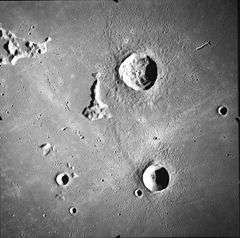Delisle (crater)
|
Lunar Orbiter 4 image | |
| Coordinates | 29°54′N 34°36′W / 29.9°N 34.6°WCoordinates: 29°54′N 34°36′W / 29.9°N 34.6°W |
|---|---|
| Diameter | 25 km |
| Depth | 2.6 km |
| Colongitude | 35° at sunrise |
| Eponym | Joseph N. Delisle |
Delisle is a small lunar crater in the western part of the Mare Imbrium. It lies to the north of the crater Diophantus, and just to the northwest of the ridge designated Mons Delisle. Between Delisle and Diophantus is a sinuous rille named Rima Diophantus, with a diameter of 150 km. To the northeast is another rille designated Rima Delisle, named after this crater.
The rim of Delisle is somewhat polygonal in form and it has a low central rise on the floor. There is some slight slumping along the inner wall, but overall the rim is still relatively fresh with little appearance of significant wear. The outer rim is surrounded by a small rampart of hummocky terrain.
This formation has also been designated "De l'Isle" in some sources.
Rima Delisle
This is a sinuous rille centered on selenographic coordinates 31.0° N, 32.0° W. It occupies a maximum diameter of 60 km. Three tiny craters in the vicinity of this feature have been assigned names by the IAU. These are listed in the table below.
| Crater | Longitude | Latitude | Diameter | Name source |
|---|---|---|---|---|
| Boris | 30.6° N | 33.5° W | 4 km | Russian masculine name |
| Gaston | 30.9° N | 34.0° W | 2 km | French masculine name |
| Linda | 30.7° N | 33.4° W | 1 km | Spanish feminine name |
Satellite craters
By convention these features are identified on lunar maps by placing the letter on the side of the crater midpoint that is closest to Delisle.
| Delisle | Latitude | Longitude | Diameter |
|---|---|---|---|
| K | 29.0° N | 38.4° W | 3 km |
References
- Andersson, L. E.; Whitaker, E. A. (1982). NASA Catalogue of Lunar Nomenclature. NASA RP-1097.
- Blue, Jennifer (July 25, 2007). "Gazetteer of Planetary Nomenclature". USGS. Retrieved 2007-08-05.
- Bussey, B.; Spudis, P. (2004). The Clementine Atlas of the Moon. New York: Cambridge University Press. ISBN 978-0-521-81528-4.
- Cocks, Elijah E.; Cocks, Josiah C. (1995). Who's Who on the Moon: A Biographical Dictionary of Lunar Nomenclature. Tudor Publishers. ISBN 978-0-936389-27-1.
- McDowell, Jonathan (July 15, 2007). "Lunar Nomenclature". Jonathan's Space Report. Retrieved 2007-10-24.
- Menzel, D. H.; Minnaert, M.; Levin, B.; Dollfus, A.; Bell, B. (1971). "Report on Lunar Nomenclature by the Working Group of Commission 17 of the IAU". Space Science Reviews. 12 (2): 136–186. Bibcode:1971SSRv...12..136M. doi:10.1007/BF00171763.
- Moore, Patrick (2001). On the Moon. Sterling Publishing Co. ISBN 978-0-304-35469-6.
- Price, Fred W. (1988). The Moon Observer's Handbook. Cambridge University Press. ISBN 978-0-521-33500-3.
- Rükl, Antonín (1990). Atlas of the Moon. Kalmbach Books. ISBN 978-0-913135-17-4.
- Webb, Rev. T. W. (1962). Celestial Objects for Common Telescopes (6th revised ed.). Dover. ISBN 978-0-486-20917-3.
- Whitaker, Ewen A. (1999). Mapping and Naming the Moon. Cambridge University Press. ISBN 978-0-521-62248-6.
- Wlasuk, Peter T. (2000). Observing the Moon. Springer. ISBN 978-1-85233-193-1.

